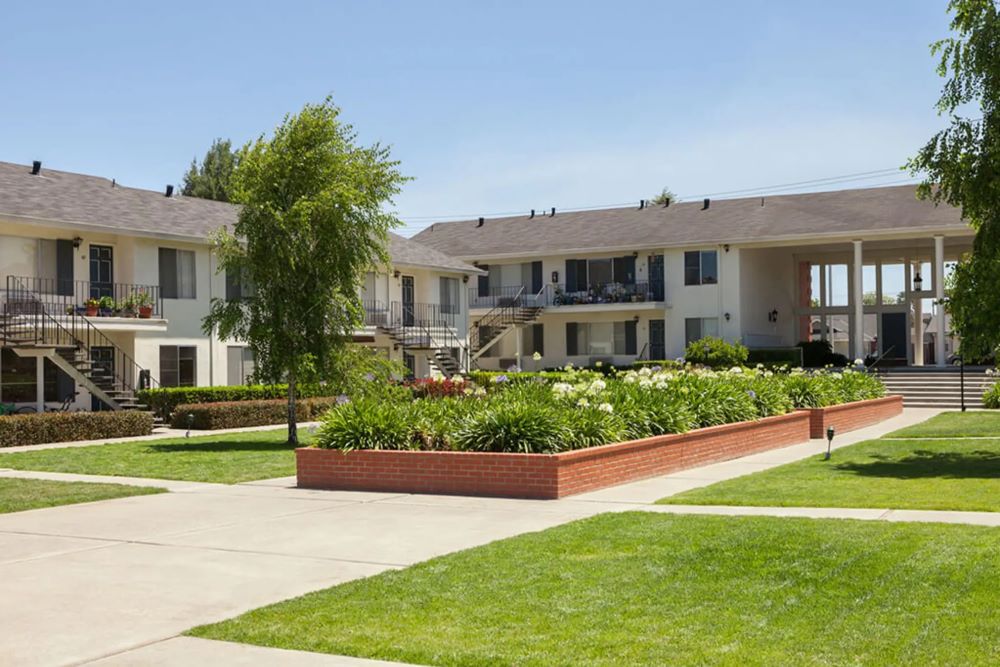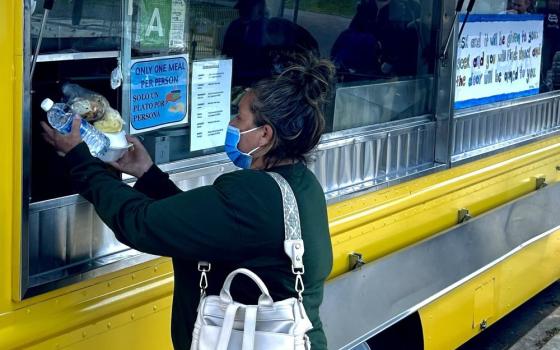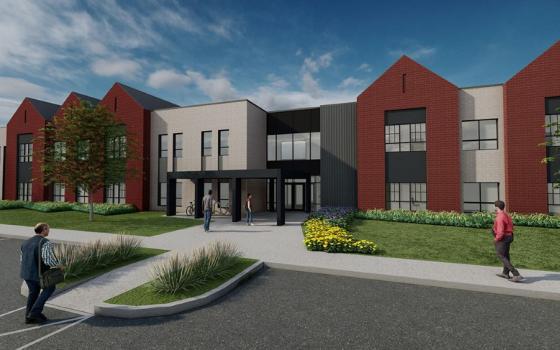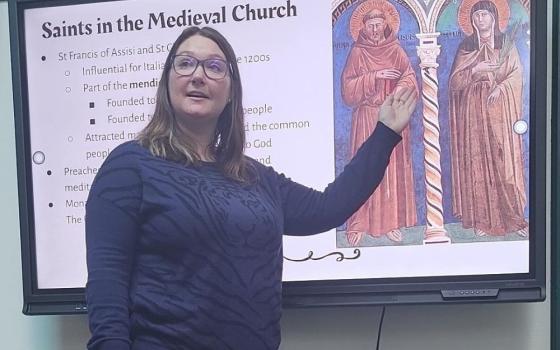
The Sobrato Family Foundation bought this 68-unit apartment building in Santa Clara, California, called Vista Pointe Apartments, as part of a pilot project to test solutions for solving the housing crisis. (Courtesy of The Sobrato Organization)
The Sobrato Organization is a multigenerational, family-owned firm based in California's Silicon Valley. For more than 65 years, the Sobrato family has been developing commercial real estate for high-growth companies, building multifamily communities and investing in entrepreneurial enterprises.
The Sobrato family is now trying to help with one of the region's most enduring challenges: creating more affordable housing. In May, the Sobrato Family Foundation paid $26.1 million for a 68-unit apartment building in Santa Clara, California. The purchase is part of a pilot project to test solutions for solving the housing crisis.
John Sobrato, the chairman of the organization, told NCR in a recent interview that he and his family hoped the purchase of the building will keep rents affordable for middle- and low-income individuals and families. "Our goal is to offer current and future residents safe and stable affordable housing," he said.
Following is the interview with Sobrato, edited for length and clarity.
NCR: What led you and the Sobrato Organization to decide to tackle one of the most challenging problems of our time — affordable housing — especially here in the middle of Silicon Valley?
Sobrato: My two sons and their cousins have been really pressing my generation (the ones running the business) to think a little more holistically, which is not easy. The objective now is to add mission, where it makes sense to, in what we're doing.

John Sobrato, board chair, The Sobrato Organization (Courtesy of The Sobrato Organization)
There are three components to what we'd like to do: preservation, production and policy.
I think we can actually make the most difference in preservation and policy. We certainly need to produce more housing, but it's difficult because for 50 years there's been a lack of political will to build enough housing to meet demand.
The cost to build housing in Silicon Valley today is $750,000 to $800,000 per unit. The only way to make that affordable is by buying the project down through grants and low-income housing tax credits. We have been a bridge for Catholic Charities as they layer up all their financing to build affordable housing, providing some grants to help get projects over the finish line. We can help a little bit there, but I didn't see that as an area where we could make a big difference over what was already being done. Therefore, we have focused on preservation because nobody else is doing that.
We are executing this preservation strategy by purchasing what is known as "naturally occurring affordable housing" or NOAH. This refers to the tens of thousands if not hundreds of thousands of units that were built in the '60s and in the '70s that are at affordable levels today.
We just bought our first one in Santa Clara called Vista Pointe Apartments. Because it was built in 1969, the current rents are relatively affordable. Although it is older, the bones are very good and the basic requirements of an apartment unit in the '60s are no different than what we build today.
When these types of units come on the market, they're never marketed to just leave it as is and continue to keep the rents affordable. They're always marketed as a value-add opportunity and the value-add aspect comes from redoing the kitchens, the bathrooms and adding fancy gyms.
The buyers force the current residents to relocate as they shut the place down to make these extensive renovations. The upgrades then trigger rent increases that run 30 or 40% higher. The apartments go from the affordable level to or above the middle-income level. That's what happens when you don't build enough housing. There's huge pressure to upgrade everything because there's demand and if somebody can't go buy a new unit because it doesn't exist, they'll go down a step. The whole thing trickles down to the bottom and those people that are in the affordable category of apartment communities get priced out because it gets upgraded.
Our goal is to offer current and future residents safe and stable affordable housing. If you operate the project voluntarily at 80% of the Area Median Income (AMI) or less, you can record a regulatory agreement that forces you to do it for some period of time and then once you have that regulatory agreement you just voluntarily agree to continue it. With the regulatory agreement we get a property tax exemption from the county because it's affordable housing and it's required now to be affordable housing even though we entered into it voluntarily. We've now forced ourselves to do it.
We can keep the rents very flat and still cover expense increases and the median income of tenants should grow at least a few percent a year.
From a developer's perspective, what changes might you suggest in policies and/or regulations that would make affordable housing more possible without compromising unacceptable harms to people or the environment?
On the policy side we need to advocate for more low-income tax credits. Typically, low-income tax credits provide 60% of the funding of the project cost. That is significant because without it you can't make the project affordable. Another policy area would be less control at the municipal level so that the entitlement process is more streamlined for new housing construction.
Advertisement
The Sobrato Organization website declares: "The Sobrato Organization's mission is to build a more equitable and sustainable world through business and philanthropic leadership."
You also have a commitment to social justice mentioned on the Family Foundation website. What is it about the growth of the Sobrato family over time that led to this statement of mission and values?
We have been blessed with tremendous success and it is an absolute fallacy to think as some do, that it's just a matter of hard work and grit. It's just not true. Yes, that is one of the ingredients. However, in our family's case the wealth was built partly because my father is a white male who came into his career in 1960 and happened to live in Silicon Valley. Had he been born in Detroit, had he been born a person of color, had he been born a woman, we would not be in the position we are: end of story.
Our commitment to justice comes from the recognition that our success in large part was a function of what Warren Buffett would say: winning the genetic lottery: being very lucky as to when we were born, where we were born, and what color we were born and therefore having a moral obligation to right some of these structural inequities of the past that continue to this day.
Why is the capital gains tax lower than the ordinary income rate? Why is the tax on money earning money — where you're not really putting your daily sweat into the "work" — less than someone working a job, whether it's a doctor at a very high salary level or whether it's somebody working at McDonald's? Why is there a home mortgage deduction that benefits homeowners? We have a tax system that is not progressive at all in that context.
Editor's note: Jim Purcell, a member of NCR's board of directors and a past chair of the group, is also a personal friend of the Sobrato family.
[This article was made possible by a grant from the Hilton Foundation.]







